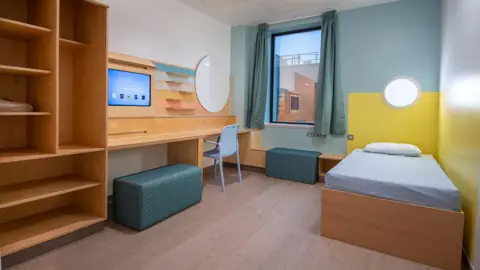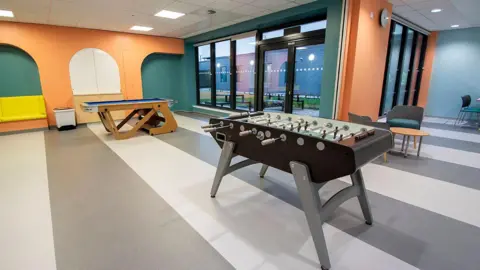 PA Media
PA MediaA new report has raised concerns about the use of physical restraint and forced tube feeding in Edinburgh’s inpatient mental health ward for 12 to 17-year-olds.
The inspection of the Melville Unit at the Royal Hospital for Children and Young People was the first in a series of visits to psychiatric wards.
The visits were ordered by ministers after BBC Scotland’s Disclosure programme uncovered allegations of a “culture of cruelty” at Skye House, the young people’s inpatient facility in Glasgow.
NHS Lothian said a “robust action plan” was already in place to address the report’s recommendations to improve care in the unit.
The inspection was carried out jointly by the healthcare watchdog and the Mental Welfare Commission (MWC).
The MWC previously visited such units but these were not considered official inspections.
It will now inspect them in a collaborative approach with Healthcare Improvement Scotland (HIS).
Both said they found high levels of staffing and examples of good practice at the Melville Unit, but also areas for improvement.
Inspectors made the unannounced visit at the 12-bed facility during a week in May.
 NHS Lothian
NHS LothianThe Melville Unit cares for young people who may have a range of mental health illnesses including eating disorders, depression and psychosis.
In the report, the MWC said that the safe use of proportionate restraint as a last resort was a “significant issue” at the unit.
Restraint was often used for nasogastric feeding – where a narrow feeding tube is placed through the nose down into the stomach.
Claire Lamza, executive director of nursing at MWC, acknowledged that there were times when restraint was needed.
But she said this should only happen after every alternative had been exhausted and as “infrequently as possible”.
She told BBC Scotland News: “We observed that it wasn’t conducted the way we would expect it to be.
“It wasn’t well documented, it wasn’t clear what was happening and, in one particular incident, we didn’t think it was a proportionate restraint.
“We wondered about the harm that was being caused to the young person as a result of that.”
The National Safety Council suggests, ideally, having up to five people present to safely control a patient where restraint is required.
But the inspectors said they had “directly observed eight staff restraining one young person” and criticised the poor recording of restraint in case records.
The report said nursing staff were “open that they would restrain with eight members of staff”.
One case record had a detailed account of a young person being restrained on the floor by six staff members which lasted two-and-a-half hours.
“While the intentions behind using restraints may be rooted in safety and care, the potential risks and consequences cannot be ignored,” the report warned.
“We heard of bruising and a relative spoke of the ‘trauma of a restraint that lasted over 1.5 hours’.”

‘I still get nightmares now’

Grace Vickers spent almost two years at the Melville Unit from the age of 16.
The now 22-year-old said the worst part of her experience was being restrained for forced tube feeding.
The Aberdeen University student said she was fed through a nasogastric tube “at least three times a day” during most of her inpatient admissions, which she said “often” involved restraints.
“I can’t tell if it’s more traumatic when it happens to you or when you witness it happening to someone else,” she told BBC Scotland News.
“I still get nightmares now – like the screams and people pleading.
“It never leaves you.
“That’s probably the most traumatic thing, especially (nasogastric) feeding because it’s painful.”
She said that, as a result of her admissions, she now suffered from complex post-traumatic stress disorder.
The inspection report acknowledged improvements since Grace was a patient at the Melville Unit.
Reflecting on her time on the ward, the student said: “Every single day, as soon as you wake up, you’re hearing someone else screaming and then later it’ll be you screaming.
“It put so much anger and fear in you. There are some nurses who made a great, good difference to my life.
“But it’s hard to be grateful for that when it feels like the rest of my life, I’m just going to have to be dealing with the things that I’ve seen and heard and been through.”

Out of 661 incidents reported at the unit over a two-year period, 533 involved use of restraint, according to the ward’s records.
Inspectors said they were also “concerned” to note a whistle-blowing report had been made about the alleged overuse of restraint at the facility in 2023.
It heard from one respondent who said assaults on staff “take place very often” and violence often led to the use of restraint.
The layout of the unit was also said to be too small, meaning incidents of aggression and violence impacted other patients who witnessed it.
 NHS Lothian
NHS LothianThe joint report said the unit had failed to make improvements based on previous recommendations by the MWC.
It added: “Lawful practice and understanding of roles and responsibilities has yet to be embedded at Melville Unit with no evidence of managerial oversight or action progressing following recommendations previously made by the commission.”
Inspectors also suggested improvements to care planning and the inclusion of parents and relatives.
The MWC noted that there was not enough for young people to do on the ward and that there was not an age-appropriate outdoor space, as the garden was “stark”.
However, the report added: “The Melville Unit staff group clearly evidenced their commitment to working to the best of their abilities for the young people they are looking after.”
It also praised staff training and staffing levels.
Meanwhile, young people in the facility reported that they felt staff listened to what they had to say about their care and treatment.
What has NHS Lothian said?
NHS Lothian said it took the findings of the report “extremely seriously” and was “committed to delivering safe, high-quality and effective care”.
Jim Crombie, the health board’s deputy chief executive, added: “The safety and care of young people and staff is always our top priority.
“Restraint is only ever used in the unit as a last resort to prevent harm for young people or to staff or other patients.”
Mr Crombie said an initiative had been introduced to reduce the use of restraint further.
He added this was observed by HIS during the inspection and had “shown positive results”.
The health board said systems were also in place to improve the recording, monitoring and auditing of restraints.
Mr Crombie added: “We continue to prioritise this work by training and educating staff in safe restraint, wider care planning, managing distress, responding to violence and aggression and supporting young people in their future care, including those who require essential nasogastric tube feeding.”
Disclaimer : This story is auto aggregated by a computer programme and has not been created or edited by DOWNTHENEWS. Publisher: BBC







